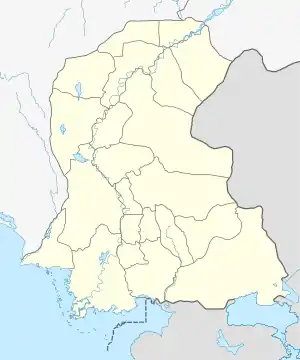Dhoraji Colony
Dhoraji Colony (Urdu: دھوراجی کالونی ) is a neighbourhood in Gulshan-e-Iqbal Town, Karachi (Karachi East), Sindh, Pakistan, located between UC-1 (Civic Center Union Council) and UC-2 (Dehli Mercantile Union Council).[1] The demarcation separating the two Union Councils runs from National Stadium Road (Coming from National Stadium, Karachi) towards Selani Chowk, past ZVMG Rangoonwala Community Centre via Siraj-ud-Daula road (the area closer to National Stadium Road falls under the Civic Center Union Council). [2][3]
Dhoraji | |
|---|---|
Town | |
 Dhoraji Location in Gulshan-e-Iqbal, Sindh, Pakistan | |
| Coordinates: 24.8872°N 67.0769°E | |
| Country | Pakistan |
| State | Sindh |
| District | Sindh |
| Languages | |
| • Official | Memoni, Urdu, English |
| Time zone | PST |
| Telephone code | +92 |
Dhoraji Colony hosts a predominately Memon Muslim community that has historically played an essential role in the development of Karachi and Pakistan.[4]
Brief history
The name 'Memon' comes from Mu'min (مؤمن, “believer” in Arabic).[5] Memons, who embraced Islam in Sindh, migrated to Kutch (Kutch district).[6] From there, they spread out to other parts in the region including Kathiawar, Dhoraji and Mumbai.[7] Memons also went on to establish communities outside the Indian Subcontinent in several Middle Eastern, African (Africa), East Asian and European countries. Following the Partition of India, many Dhoraji Memon families migrated back to Karachi, Sindh, in the newly formed state of Pakistan. [8]
Places/organizations of interest
References
- "Gulshan-e-Iqbal Town Map" (JPG). Sbca.gos.pk. Retrieved 2 August 2018.
- "Gulshan Town, Karachi Sindh Pakistan". Shehar-e-karachi.blogspot.com. Retrieved 2 August 2018.
- "Karachi East District UC List, MNA MPA Seats کراچی ضلع شرقی". Politicpk.com. Retrieved 2 August 2018.
- Levin, Sergey (1974). "The Upper Bourgeoisie from the Muslim Commercial Community of Memons in Pakistan, 1947 to 1971". Asian Survey. 14 (3): 231–243. doi:10.1525/as.1974.14.3.01p04292. ISSN 0004-4687. JSTOR 2643012.
- Goolam, Vahed (2006). "'Unhappily Torn by Dissensions and Litigations': Durban's 'Memon' Mosque, 1880-1930". Journal of Religion in Africa. 36: 23–49.
- Eisenlohr, Patrick (1972). "The Politics of Diaspora and the Morality of Secularism: Muslim Identities and Islamic Authority in Mauritius". Journal of the Royal Anthropological Institute. 12 (2): 400.
- Moore, Mick (1997). "The Identity of Capitalists and the Legitimacy of Capitalism: Sri Lanka since Independence". Development and Change. 28 (2): 331–366. doi:10.1111/1467-7660.00045. ISSN 0012-155X.
- Papanek, Hanna (1972). "Pakistan's Big Businessmen: Muslim Separatism, Entrepreneurship, and Partial Modernization". Economic Development and Cultural Change. 21 (1): 11.
- "Masjid e Habibia". Facebook.com. Retrieved 2 August 2018.
- "Mustafa Masjid". Facebook.com. Retrieved 2 August 2018.
- "Contact Jamal Noor". Jamalnoorhospital.com. Retrieved 2 August 2018.
- "V.M.Public School". Facebook.com. Retrieved 2 August 2018.
- "ZVMG Rangoonwala Trust". Rcc.com.pk. Retrieved 2 August 2018.
- "Saylani Chowk - Karachi, Pakistan - Neighborhood - Facebook". Facebook.com. Retrieved 2 August 2018.
- "Dhoraji Association Karachi". Dhorajiassociation.org. Retrieved 2 August 2018.
- "Dhoraji Youth Service Foundation". Dhorajiyouth.org. Retrieved 2 August 2018.